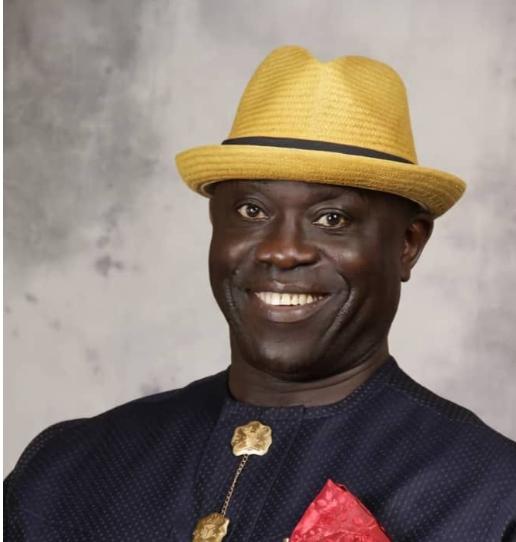News
PAP: Those Calling For Ndiomu’s Sack Beneficiaries Of Corrupt System – Group

A sociopolitical pressure group under the aegis of Niger Delta Integrity Group (NDIG) has asserted that those calling for the sack of the Interim Administrator of the Presidential Amnesty Programme (PAP), Man. Gen. Barry Ndiomu were those who had fraudulently benefited from the programme in the past.
The group said its attention has been drawn to a threat by a group of “disgruntled elements who claim to be under the first, second and third phases of the Presidential Amnesty Programme (PAP), and have resolved to occupy the Amnesty Office to demand for the sack of Major General Barry Ndiomu (rtd), the visionary Interim Administrator of the PAP.”
A Statement by the convener, NDIG, Dr. BOMA Horsefall said Gen. Paul Johnson and Solomon Adu the two sponsors of the recently publicized communique threatening protest, are fighting back because the new administration of the PAP has stopped their fraudulent practice of feeding fat from the Programme.
According to the statement, it is to the knowledge of the NDIG that while John has been criminally receiving monthly stipends with two separate accounts since 2010, Solomon has been doing the same with six accounts, all linked to one BVN for the same period.
READ ALSO: INC, IYC, Ann Kio-Briggs Applaud Ndiomu For Creating Cooperatives To Empower Ex-agitators
The statement said the duo are now frustrated by the reality that General Ndiomu is out to rid the system of fraud, hence their decision to fight back to maintain the status of corruption they have benefited massively from.
It notes that by the design of the Amnesty Programme, after beneficiaries are absolved, trained and empowered, they are to exit and pave way for others and wondered why the organizers of the planned protest, Paul and Solomon) have both refused to exit the Programme after 12 years.
The NDIG enjoined the Interim Administrator not to be deterred in his resolve to reposition the Amnesty Programme in the interest of the Niger Delta Region and called on those bent on distracting General Ndiomu bury their head in shame, as their malicious attempt to blackmail the highly revered Interim Administrator is already dead on arrival.
News
NMA To Withdraw Medical Services In Edo Over Kidnapped Colleagues

The Nigeria Medical Association (NMA), Edo State Branch, has threatened to withdraw medical services across the state, effective from Saturday, 10 January, 2026.
This followed the recent abduction of two medical doctors on January 1st and 2nd, 2026.
Chairman of the NMA Edo State branch, Dr. Eustace Oseghale, in a statement made available to newsmen in Benin on Friday, stated that the withdrawal of services was a direct consequence of the abduction of their colleagues and a reflection of the heightened sense of vulnerability among medical practitioners in the state.
READ ALSO:Doctors’ Strike Continues As NARD Demands Fair Deal, Better Pay
Oseghale, on behalf of the NMA, called for immediate release of the abducted doctors and implementation of measures to prevent future incidents.
The statement reads: “This incident raises concerns about healthcare professionals’ safety in Edo State, threatening their lives and undermining healthcare delivery.
“We demand the immediate release of our abducted colleagues as well as enhanced security protocols for Edo State residents and regular engagement between NMA Edo and the Edo State Government on security concerns.”
READ ALSO:Edo Targets 2.2 Million Children For Measles, Rubella Vaccination
The NMA Chairman, while insisting on withdrawal of services statewide if their demands aren’t met, stressed that a safe working environment is crucial for healthcare providers.
“We’ll continue to withhold services until our demands are met and colleagues are safe.
“We urge a swift resolution and the safe return of our colleagues. Security operatives should take this seriously, as they’ll be held responsible for the consequences of our action,” Oseghale said.
News
Edo Targets 2.2 Million Children For Measles, Rubella Vaccination

The Edo State Government says it is targeting about 2.2 million children aged between 0 and 14 years for measles and rubella vaccination across the state.
The Director of Disease Control and Immunization at the Edo State Primary Health Care Development Agency, Dr. Eseigbe Efeomon, who disclosed this during stakeholders’ sensitisation meeting in Benin City, said this would be done in collaboration with development partners.
Efeomon, while noting that the vaccination exercise scheduled to hold simultaneously from January 20 to January 30, 2026, across the 18 local government areas of Edo State at designated health facilities and temporary vaccination posts, said the campaign aims to contribute significantly to the reduction of measles and rubella in Nigeria.
He explained that achieving this target requires increased population immunity through sustained vaccination.
READ ALSO:Man Arrested In Edo For Alleged Abduction Of 4-year-old
Dr. Efeomon stressed that only qualified and certified health workers would be recruited as vaccinators because the vaccines are injectable.
According to him, the vaccination strategy would involve fixed posts and temporary fixed posts, and vaccination cards would be issued to all vaccinated children as proof, which parents and caregivers are advised to keep for future reference.
He added that vaccination teams would visit schools, churches, mosques, markets, motor parks, internally displaced persons’ camps and other public places, while children who receive the vaccine would be finger-marked to prevent double vaccination.
He reiterated that the overarching goal of the campaign is to drastically reduce rubella incidence nationwide and protect children from preventable diseases through effective immunisation coverage.
READ ALSO:Edo widow-lawyer Diabolically Blinded Over Contract Seeks Okpebholo’s Intervention
Also speaking, the World Health Organization Local Government Facilitator, Mr. Ajaero Paul, described measles and rubella as major causes of death and congenital abnormalities among children globally.
He said both diseases are preventable through the measles-rubella vaccine, which he described as safe and effective,
He added that sustained advocacy is critical to reducing child mortality and lifelong disabilities.
On his part, UNICEF Social and Behavioural Change Health Officer, Yakubu Suleiman, emphasised that the measles-rubella vaccine is safe and effective for all children aged nine months to 14 years.
READ ALSO:Edo: Suspected Kidnappers Kill Victim, Hold On To Elder Brother
He stated that the government has fully paid for the vaccines, making them available at no cost to all eligible children in government health facilities across the state.
Suleiman explained that vaccination not only protects individual children but also safeguards communities from deadly vaccine-preventable diseases such as measles and rubella.
He added that even children who had previously received the measles vaccine should still be given the measles-rubella vaccine and appealed to schools and other key stakeholders to support the campaign to ensure that no child is left behind.
News
Togo, Niger, Benin Owe Nigeria Over $17.8m For Supplied Electricity – NERC

Nigeria’s electricity regulator has disclosed that three neighbouring countries, Togo, Niger and Benin, are indebted to Nigeria to the tune of $17.8 million, equivalent to more than N25 billion at prevailing exchange rates, for power supplied under bilateral electricity agreements.
The Nigerian Electricity Regulatory Commission, NERC, made this known in its Third Quarter 2025 report, which reviewed market performance within the Nigerian Electricity Supply Industry, NESI.
According to the report, the international customers were billed a total of $18.69 million by the Market Operator for electricity supplied during the third quarter of 2025. However, only $7.125 million was paid, leaving an unpaid balance of $11.56 million for the period under review.
NERC also revealed that the same international offtakers had outstanding legacy debts amounting to $14.7 million from previous quarters. Of this amount, $7.84 million was settled, leaving a residual balance of $6.23 million.
READ ALSO:Expert Identify Foods That Increase Hypertension Medication’s Effectiveness
When combined with the Q3 2025 shortfall, the total outstanding debt stood at $17.8 million, which translates to about N25.36 billion at an exchange rate of N1,425 to one US dollar.
The regulator identified the international electricity customers as Compagnie Énergie Électrique du Togo, Société Béninoise d’Énergie Électrique of Benin Republic, and Société Nigérienne d’Électricité of Niger Republic.
NERC stated that the three utilities collectively paid just $7.125 million against the $18.69 million invoice issued for electricity supplied in the third quarter, resulting in a remittance performance of 38.09 per cent.
This meant that more than half of the billed amount remained unpaid at the close of the quarter.
READ ALSO:Electricity Workers Threatens Shutdown Over Staff Brutality
The commission explained that the electricity exported to the three countries was generated by grid-connected Nigerian generation companies and delivered through cross-border bilateral power supply arrangements.
By contrast, NERC reported a stronger payment performance among domestic bilateral customers. According to the report, local customers paid N3.19 billion out of the N3.64 billion invoiced for the same quarter, representing a remittance rate of 87.61 per cent.
The regulator further noted that some bilateral customers, both international and domestic, made additional payments to offset outstanding invoices from earlier quarters.
READ ALSO:Reps Ask NERC, DISCOs To Reverse Band A Tariff Hike
Specifically, the Market Operator received $7.84 million from international customers and N1.3 billion from domestic customers in settlement of previous obligations.
Beyond bilateral transactions, NERC disclosed that Nigeria’s 11 electricity distribution companies remitted a total of N381.29 billion to the Nigerian Bulk Electricity Trading Plc and the Market Operator in the third quarter of 2025. This was out of a cumulative invoice of N400.48 billion, translating to an overall remittance performance of 95.21 per cent.
The commission said the figures were derived from reconciled market settlement data submitted as of December 18, 2025, as part of its statutory evaluation of the commercial health and performance of the electricity market.

 News5 days ago
News5 days agoWhat I Saw After A Lady Undressed Herself — Pastor Adeboye

 Headline5 days ago
Headline5 days agoPROPHECY: Primate Ayodele Reveals Trump’s Plot Against Tinubu

 Metro5 days ago
Metro5 days agoArmed Robbers Shot PoS Operator To Death In Edo

 Business4 days ago
Business4 days agoNNPCL Reduces Fuel Price Again

 Metro4 days ago
Metro4 days agoAAU Disowns Students Over Protest

 Metro5 days ago
Metro5 days agoJoint Task Force Kills 23 Bandits Fleeing Kano After Attacks

 Headline2 days ago
Headline2 days agoRussia Deploys Navy To Guard Venezuelan Oil Tanker Chased By US In Atlantic

 Metro4 days ago
Metro4 days agoEdo: Suspected Kidnappers Kill Victim, Hold On To Elder Brother

 Metro4 days ago
Metro4 days agoNine Soldiers Feared Dead In Borno IED Explosion

 Politics5 days ago
Politics5 days ago2027: Rivers APC Pledges To Follow Wike’s Instructions




















